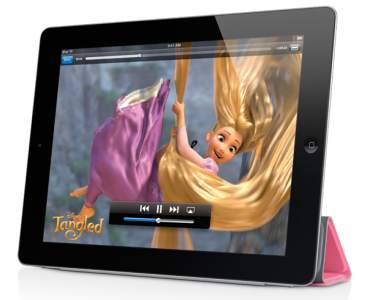As I was conducting interviews about the iPad 2, one of the typical comments I didn’t pick up until later was that the second-gen launch lacked the frenzied excitement surrounding the unveiling of Apple’s original iPad tablet.
In my head, I was having trouble reconciling this observation because I’d drawn a line of things Apple needed to do to maintain its dominance in the tablet space.
With one small exception of 4G, Apple has jumped over and over that line with ease. What I’d forgotten, however, was the impression of a “magical” tablet, which I don’t think was successfully conveyed this time around.

Really, I wonder if Steve Jobs did more damage than good on stage this year. Let me explain.
Apple’s Sustaining Advantage
What Steve Jobs and Apple have historically had as an advantage at events – from the first Mac to the last iPad – is that the product itself is the star.
Steve is more of a Master of Ceremonies presenting the product. As such, the ovations aren’t for Steve, they are for whatever he is presenting.
However this time – because Steve‘s appearance was a surprise and there are so many concerns surrounding him – he was the star, rather than the iPad.
As a result, while the launch was far from boring, it didn’t focus people solidly on the product. Instead, folks almost immediately started to take apart the presentation or look under the covers.
The first piece was on Fortune and dissected the iPad 2 presentation – alleging that Steve Jobs lied or intentionally provided misleading information about the iPad and its market.
Similarly, CNN took the product apart in a piece focused primarily on analleged Steve Jobs iPad 2 cover up.

If you recall, one of the first head-to-head reviews of Motorola’s Xoom tablet versus the iPad favored the Android-powered device by omitting the iPad’s Apple magic and heritage.
Eventually, the buzz shifted to a rumor that Jonathan Ive was leaving Apple, which – given he is he designer credited for the sleek iPad – doesn’t bode well either.
Of course, the point really isn’t if Steve did or did not do these things, especially as he is known to embellish and that’s really not news.
But still, its quite is unusual for folks in major news organizations to take apart one of Apple events this quickly, rather than just praising the product.
This may indicate the Tablet Bubble is starting to trend to something more akin to the Netbook bubble. What differentiated the two over the past months was Apple’s “magic.”
Now, if the magic is falling, so too could the broad tablet market, at least in the near term.
Will the iPad 2 Fail?
Actually, I think they will have lines for the iPad 2, at least initially. If those first customers get excited about the device then Apple will be fine – although I’d still likely question whether anybody else will be; given no other tablet has yet to sell as well.

Then again, people could be tiring of the device class.
Indeed, I’ve recently heard about a number of folks shelving tablets in favor of a laptop because it remains limited in terms of creation and has similar location limitations (outside use sucks) – with laptops and laptop battery life is approaching 30 hours against the tablet’s historic advantage of 10.
So It is possible the right device could take the market back to a form factor that it is more like a traditional laptop.
I actually think the PC vendors should fight back harder than they are because this counter trend would favor them.
Wrapping Up: Global Communicator
I still think the device the market is truly looking for is one that is closer to Gene Roddenberry’s Global Communicator and substantially more advanced than any class of smartphone or tablet we have today.
Until such a device arrives the interim models are at risk.
Remember, most consumers don’t own smartphones yet and classic laptop market still dwarfs the nascent tablet market. We are clearly looking for something.
If what arrives is closer to the ideal than what Apple or anyone else has – and is well marketed – all of what we currently see in the market today can and will become obsolete. Of course, the least common products are likely to go first.
Rob Enderle is one of the last Inquiry Analysts. Inquiry Analysts are paid to stay up to date on current events and identify trends and either explain the trends or make suggestions, tactical and strategic, on how to best take advantage of them. Currently, he provides his services to most of the major technology and media companies. The opinions expressed in this commentary are solely those of the writer.






